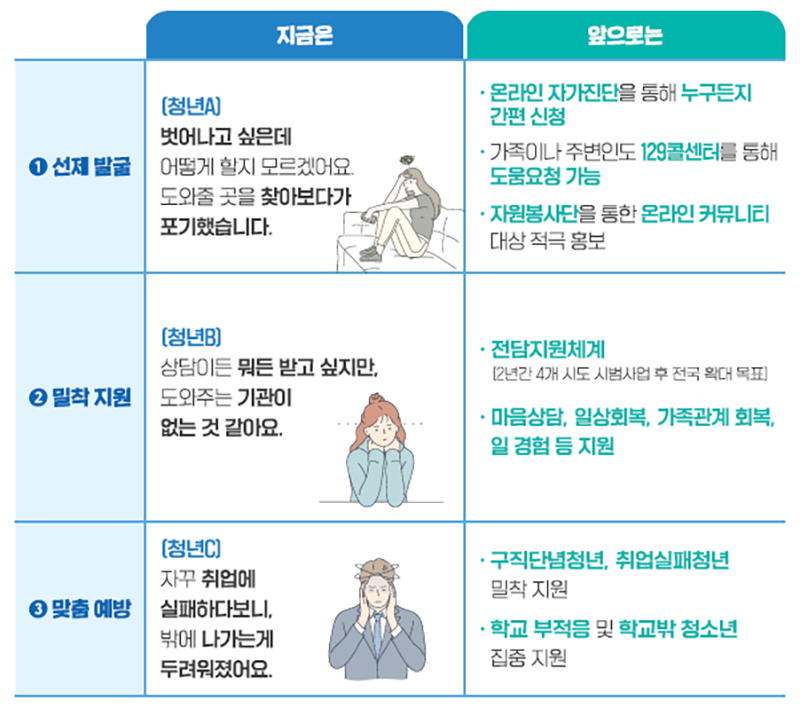Announcement of ‘Support plan for isolated and reclusive youth’… Youth section added to 129 call category
The government is establishing a one-stop help desk, such as improving the online self-diagnosis system and the 129 call center, to detect and discover early signs of crisis of isolation and seclusion among young people.
Accordingly, in the second half of next year, a self-diagnosis system will be established on the public website under the Ministry of Health and Welfare to enable anyone to easily diagnose the level of isolation and seclusion crisis 24 hours a day.
In addition, we plan to create a separate section for youth in the 129 Call Health and Welfare Counseling Center category so that requests for help can be made through a single number, 129, starting from the second half of next year.
For the isolated and reclusive youth discovered in this way, a dedicated support system will be operated through a pilot project starting next year, and ‘(tentative name) Youth Future Center’ will be established in four cities and provinces to gradually support their return to society.
In particular, in the case of isolated and reclusive youth, we plan to assign dedicated personnel to the Out-of-School Youth Support Center to provide a package of support from discovery, learning and healing support, and follow-up management.
At the Youth Policy Coordination Committee held on the 12th, the Ministry of Health and Welfare announced the ‘Isolated and Secluded Youth Support Plan’, which includes these contents, jointly established by related ministries.

129콜 보건복지상담센터에서 상담 (사진 출처: https://khmumagazine.tistory.com/8)
In Korea, too, the number of young people who responded that they ‘rested’ at home is increasing in surveys, and concerns are growing about the lack of a social relationship safety net as we go through COVID-19.
In particular, according to the results of the ‘2022 Youth Life Survey’ and the National Statistical Office’s social survey last May, it was estimated that the number of youth at risk considering isolation and seclusion could reach up to about 540,000.
Accordingly, the Ministry of Health and Welfare conducted an in-depth online survey of young people aged 19 to 39 across the country for two months from July to August, and based on the results, developed a ‘Support Plan for Isolated and Secluded Youth’ through intensive discussions among related ministries.
◆ Establishment of an early discovery system for isolation and seclusion
Starting from the second half of next year, a central-level, permanent search system will be established for isolated and reclusive youth, and a one-stop help desk will be established so that those who are isolated or reclusive can request external help at any time through a non-face-to-face or online method.
In particular, the 129 call center is utilized so that not only the person concerned but also those around them, such as family members, friends, and convenience stores, can easily request help for young people who are showing signs of crisis.
The ‘Request for Help’ case will be linked to the 2024 pilot project for isolated and reclusive youth and local government resources to support dedicated case management through on-site visits by case managers and initial counseling.
In addition, we plan to use youth interns from the Ministry of Health and Welfare to recruit volunteer groups such as college students and carry out promotional activities such as intensive discovery and online self-diagnosis for online communities where isolated and reclusive young people are mainly active.
In addition, the cooperation system with existing cooperation networks for discovering blind spots in welfare, such as local governments, police, fire, and local residents (gosiwons, studio apartments, convenience stores, etc.), will be strengthened.
Meanwhile, during this in-depth investigation, 1,903 parties officially requested help with consent to provide personal information.
Accordingly, in connection with next year’s pilot project, dedicated case managers will begin initial counseling and case management.
In addition, for young people preparing for self-reliance who are at high risk for isolation and seclusion, we will strengthen support for isolation and seclusion prevention programs in parallel with self-reliance preparation by deploying personnel dedicated to de-isolation and seclusion within institutions dedicated to self-reliance preparation.
◆ Establishment of a dedicated support organization
Next year, four regions will be selected through a public contest and a youth future center (tentative name), a dedicated organization dedicated to supporting isolated and reclusive youth, will be established and a pilot project to support youth will be conducted.
For young people who request help online, a dedicated case manager assigned to the center provides a customized program by establishing a care plan after an on-site visit. Through a two-year pilot project, we plan to develop leading models such as various service models and self-pay methods and promote nationwide expansion.
Linkages with existing services will also be strengthened to enable referral to youth mental health services based on the judgment of the case manager during the initial consultation, and the scope of target will be expanded to include young people from single-person households who need daily care services.
In addition, we will reduce the inconveniences in daily life for young people living separately from their families and strengthen the human protection network in case they suddenly become sick alone.
Meanwhile, starting in 2024, 36 case management personnel dedicated to isolation and seclusion will be assigned to the Out-of-School Youth Support Center, and a specialized purchase-lease system will be used to help create necessary spaces such as youth-specific communal living and community during the case management program.
◆ Strengthening safety nets by life cycle
Starting in 2024, the safety net will be strengthened in daily life for each life cycle before and after adolescence, such as school age between 13 and 19 years old, job search after college graduation, and early employment.
Accordingly, the designation of leading schools that operate integrated support teams (tentative names) within schools has been expanded to provide customized, close support to students experiencing difficulties such as school violence and school maladjustment.
In addition, for students who have dropped out of school and do not attend school, relevant information is quickly linked to the Out-of-School Youth Support Center, and under the responsibility of the Out-of-School Youth Support Center, students at risk in the community are promptly supported.
The Ministry of Employment and Labor plans to establish a new youth growth project (tentative name) targeting young people who are resting due to job failure or job change, and expand the existing youth challenge support project.
Through this, we plan to provide in-depth counseling and case management to young people who are having difficulty finding jobs, as well as support them in exploring appropriate career paths and strengthening their employment capabilities.
In addition, a new on-boarding program will be established to improve the rigid corporate culture and support young people in their early stages of employment to quickly adapt to the workplace.
The Ministry of Culture, Sports and Tourism also plans to expand the cultural care program targeting emotionally vulnerable young people and provide support in connection with the Ministry of Health and Welfare’s case management program.
◆ Efficiency of field worker management system
We provide support through an information system (Hope eum) so that field workers, such as case managers, can work efficiently, and we also streamline the management system by preparing a standard case management manual and regular refresher training courses for workers.
In addition, through a two-year pilot project for a support system dedicated to isolated and reclusive youth, the legal basis necessary for nationwide expansion, such as definition of support recipients, information protection, and service quality management measures, will be prepared to ensure that the project can be established in line with nationwide expansion.

Minister of Health and Welfare Cho Kyu-hong explained, “In May of this year, as soon as we learned of the research results showing that the number of isolated and secluded young people could reach approximately 540,000, we quickly focused on conducting an in-depth survey of the situation and preparing measures.”
He continued, “This plan is significant in that it is the government’s first comprehensive measure targeting only isolated and reclusive youth, developing the contents of the ‘Five Youth Welfare Tasks’ announced last September.”
In particular, he said, “I know very well that there are many young people who are struggling with anxiety about the future,” and “the government stepping in to help them live their daily lives like ordinary young people is also a way to preemptively prevent various social problems.” .
He added, “To prevent isolated and reclusive young people from blaming themselves and withdrawing from society, the Ministry of Health and Welfare plans to provide broad support to them through various youth welfare policies.”
Source: Ministry of Health and Welfare – Policy news, link


Comments